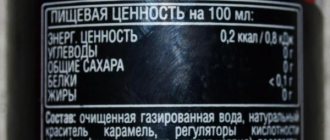I'm guessing the question is about the difference between regular cola and zero. So, instead of sugar (which in large quantities can cause problems with teeth, excess weight, etc.), Coca-Cola Zero contains the sweeteners acesulfame and aspartame. Since both of these substances are many times sweeter than sugar, very small amounts are required to make the drink sweet and at the same time have close to zero calorie content. And about the harm: both aspartame and acesulfame are recognized as safe for health and approved for use.
I will add to the above that any carbonated drink, especially those containing flavors and dyes, has an irritating effect on the gastric mucosa (under the influence of CO2, the secretion of hydrochloric acid increases), which, with prolonged use, leads to heartburn, gastritis, and peptic ulcers; Belching and bloating appear; Allergic reactions are possible, especially if there is a tendency; If the drink contains caffeine, it has a stimulating effect on the nervous system, which is contraindicated for children. Conclusion: the benefits of Cola Zero are truly zero, because it contains all of the above components.
Source
When we go on a diet, we take great pleasure in drinking Coke and Pepsi Light. Naturally: when regular cola has 42 kcal per 100 ml (+ a huge amount of sugar), sugar-free cola becomes a real salvation. Dr. Dukan even directly recommends it to everyone who is losing weight using his method. But is this method of getting rid of hunger really that good?
Infographics: instead of a thousand words
This terrible aspartame
Diet Coke retains its sweet taste thanks to the sweetener aspartame. By the way, aspartame holds the honorable title of the most studied dietary supplement in history. Aspartame is about 200 times sweeter than sugar, so you only need very, very little of it. At the same time, aspartame can cause harm to health only if a single safe dose of 40 mg per 1 kg of body weight is exceeded. Simple calculations show that a person weighing 68 kg would need to drink more than 20 cans of Pepsi Light a day for it to in any way harm the body.
(However, this only applies to aspartame. Do not overuse light soda at all - if you drink more than 3 cans a day, due to the high acidity of the drink, the risk of tooth decay increases significantly. Study 1, Study 2)
However, there is another danger lurking in aspartame. It is made up of amino acids, and one of them, phenylanine, is not absorbed by people with phenylketonuria. So far, the reason why some people become intolerant to this particular amino acid has not been clarified.
Despite its proven harmlessness, diet cola is not considered healthy. The Coca Cola Company recently introduced a new variation - Diet Coke Plus, a cola fortified with vitamins and minerals. But even this step did not force Canada, for example, to allow the sale of Diet Coke on its territory.
Diet soda composition and other dangers
Diet cola contains 0.3 kcal per 100 g. But nevertheless, a recent study by the American scientific community CSE (Council of Science Editors) proved that diet drinks may not help you lose weight, but, on the contrary, contribute to weight gain. It's all about how the carbon dioxide contained in soda affects the walls of the stomach. It provokes the secretion of gastric juice. And this secretion causes a serious appetite in a person. As a result, you either pounce on food and overeat, or endure it to the last, which is fraught with a stomach ulcer.
Another disadvantage of Diet Coke is the phosphoric acid it contains. It helps remove calcium from the body, literally washing it out of the bones. As a result, bones become brittle, which can lead to the development of osteoporosis.
And don’t forget the BBC experiments: TV journalists successfully scrubbed away old stains with “light” carbonated water, used it as a glass cleaner, etc.
According to an NCBI study, drinking diet soda also increases the risk of developing metabolic syndrome by 36%.
From a can or from a bottle?
If, despite the above, you are not ready to give up soda forever, choose canned soda. It is known that plastic has a very bad effect on the drink contained inside. The bottles contain bisphenol A, which reduces fertility by affecting hormones. Here is a study on this topic for those who read English.
What to choose?
Clean water. It contains no calories and brings only benefits to the body.
Video on the topic (we make a discount on the first channel):
Source
A little history
For centuries, the drink has delighted its fans with its unchanged composition and recognizable taste. The bouquet of the drink is unique and its production is kept secret from competitors. Nowadays there is a lot of talk about the dangers of cola, but not everyone knows what exactly its harm is. It is believed that Coca-Cola Light is completely harmless, because it contains no empty calories.
At the beginning of cola production, the ingredients were not only unhealthful, they were simply dangerous. After all, one of the main components was an extract from the leaves of the coca plant. Much later, they learned to make a drug from these same leaves. But at that time, more and more new soda lovers found a refreshing and invigorating drink. Due to the fact that there have been cases of overdose of the soft drink, the recipe was slightly changed. An extract from another part of the plant, which did not contain narcotic substances, was added to the drink.
Composition and calorie content
Everyone knows that the recipe for cola is a closely guarded secret. However, there is still some data. The composition of Coca-Cola Light differs from regular Coca-Cola only in the absence of sugar. In addition to extracts from the leaves of the plant, the composition includes sugar or aspartame, caffeine, citric acid, vanilla, and caramel. To create exactly that unique aroma and taste of soda that is popular all over the world, a secret mix of aromatic oils was compiled. Oils of orange, lemon, cinnamon, nutmeg, coriander and neroli in certain proportions allow you to recognize the taste of Coca-Cola even with your eyes closed.
The calorie content of regular Coca-Cola is 42 kcal per 100 g. Soda contains 10.4 g of carbohydrates. Considering that no one drinks cola in hundred-gram glasses, more and more buyers are choosing Coca-Cola Light, which contains 0 calories. The sugar in this drink has been replaced with artificial sweeteners - this is how manufacturers got rid of the high calorie content of Coca-Cola Light. Has these changes made cola any more harmless?
Calorie content of regular cola
The calorie content of Pepsi is 38 kcal, and that of cola is 42 kcal per 100 g (classic version). The drink does not contain proteins, fats, and there are 10.4 g of carbohydrates. There are few vitamins, minerals, and other useful substances here; from this point of view, the product also has no value.
For example. Half a liter of Coca-Cola contains 210 calories. The same amount of calories is contained in a bowl of soup cooked in low-fat broth, or a portion of boiled fish with stewed vegetables. Whether it’s a lot or a little is up to you to decide.
Cola zero
Recently, lighter, lower-calorie versions of carbonated drinks have become popular. These include Cola Zero. This is an excellent option for those who watch their figure, keep a food calculator, or are interested in how many calories are in a particular product.
The energy value of this cola is 0.3 calories. Fats and carbohydrates are completely absent, and protein is 0.1 grams. There's no sugar here. Sweeteners are used instead. For example, acesulfame, which tastes much sweeter than sugar, so very little is needed. It has a bitter metallic taste, so it is used in conjunction with another sweetener. It is aspartame. It is 150-200 times sweeter than sugar and has no odor. That is why, in drinks where it is present, the number of calories is very low.
Both sweeteners are officially recognized as completely safe for humans. But it's not that simple. Some sweeteners may contain phenylalanine. This substance is especially dangerous for those with phenylectonuria. Therefore, if you have this disease, consult your doctor whether you should drink cola or Pepsi.
It is also important that any soda contains carbon dioxide. If you constantly consume cola or Pepsi in large quantities, this will not only cause gastrointestinal diseases, but can also cause allergies.
Cola light
Here the content of vitamins and minerals is the same as in zero. The light version also does not use sugar. Calorie content – 0.2 kcal. In Coke Light, in addition to the sweeteners acesulfame and aspartame, there is also sucralose. This is a relatively new sweetener that is the safest. Its taste characteristics are close to sugar. Cola and Pepsi Light are slightly different in taste from Zero. Apparently due to the composition of the sweeteners.
Also, these soft drinks differ in design. Cola Light has a more feminine design, so men are more willing to buy the Zero version. Here the design is in brutal black and men like it more. Some even consider the release of zero a brand reboot, since men were not particularly willing to buy light. And precisely because of the design.
Negative effects of the drink on the body
So much has been said and written about the dangers of Coca-Cola. Everyone knows that carbonated drinks are very bad. And the harm from Coca-Cola Light is no less than from other carbonated drinks. But why is it bad and how little is it, anyone wonders.
There is not a single healthy carbonated drink. The reason lies not only in the content of a large amount of sugar, but also in carbon dioxide and other acids found in the pop.
Coca-Cola Light does not contain sugar, but there are very dangerous sugar substitutes: aspartame and sodium cyclamate. These substances are considered carcinogenic. Therefore, light is increasingly consumed by patients with diabetes and obese people. Which only worsens their health problems. Drinks containing aspartame may make people more likely to consume sugary foods because the body loses its ability to accurately estimate the number of calories consumed after consuming artificial sweeteners.
Carbonated drinks like Coca-Cola Light or Zero do not provide any nutritional value to the body: they do not contain any beneficial vitamins, minerals, or fiber.
The caffeine in cola may also pose certain health risks. Although the amount of caffeine in this soda is relatively small compared to a cup of coffee, some people may be very sensitive to its effects. These include pregnant women and people with certain medical conditions that cause the body to absorb caffeine more slowly than usual.
Caffeine can cause unpleasant side effects such as anxiety, irritability, and difficulty sleeping, especially when consumed in excess.
Despite the fact that Coca-Cola is indeed a very sweet product, even without sugar, it is also salty. Few people know about this fact, however, one standard serving of cola contains 40 mg of sodium. What makes this drink deadly for people with hypertension. Salt is known to have the properties of increasing blood pressure.
The content of orthophosphoric and citric acids in the drink leads to problems with the gastrointestinal tract. Acids have an aggressive effect on the lining of the stomach and can also destroy tooth enamel. Frequent consumption of cola, whether regular or diet cola, causes osteoporosis because it leaches essential calcium from the bones.
Drinking cola with ice, which is how most people drink it, does not allow food to be completely digested in the stomach, which leads to gastritis, ulcers, and intestinal problems.
Composition and features of the drink
The exact recipe and proportions are a trade secret. But it is known that Coca-Cola's chemical composition is as follows:
- Purified water.
- Caffeine.
- Sugar.
- Dyes, food additives.
- Flavors.
- Orthophosphoric acid.
- Small amounts of calcium, potassium, sodium, magnesium, phosphorus.
- Lemon and cinnamon oils.
Previously, Cola contained coca leaf with a small amount of cocaine. However, later the recipe was changed. Now this includes squeezed leaves, which do not contain the drug.
Unlike Cola, Pepsi's recipe is not a secret. Back in 1923, after the collapse of the company that owned the secret formula and litigation, the recipe became public domain.
The two drinks taste little different. The chemical composition of Coca Cola and Pepsi contains almost the same ingredients. The only difference is the ratio. Some people note that Coca-Cola is harsher, while Pepsi is softer.
It is important to note that regular Coca-Cola and Pepsi-Cola contain a lot of glucose. The same cannot be said about light and zero. These are light versions, there is no sugar, which means there are significantly fewer calories.
Benefits and harm to the body
Cola and Pepsi carry both harm and benefit. The main disadvantage is that their consumption negatively affects the figure, since they contain a large amount of sugar. But this can be easily corrected by replacing the use of regular cola with “Light” and “Zero”. The disadvantages also include:
- Irritation of the gastric mucosa (caused by carbon dioxide). May cause gastritis and ulcers.
- Destruction of tooth enamel. As a result, caries may develop.
- The appearance of kidney stones.
- Risk of increased blood pressure. As a result, the load on the heart muscle increases. For this reason, it is undesirable to drink cola or Pepsi for hypertension.
- Calcium leaching. As a result, calcium deficiency may develop. Dangerous for bones and teeth.
After consumption, the load on the liver increases. There is also a release of insulin, and this is dangerous for patients with diabetes. Therefore, cola and Pepsi are not recommended for overweight people.
Drinking Cola and Pepsi can lead to many problems. But there are also positive aspects here:
- Improves mood, helps cope with depression, increases performance.
- Stimulates brain function.
- Improves memory.
Pepsi and Coca-Cola contain caffeine. Thanks to him, drinks have positive properties. However, the benefits that these carbonated drinks can bring are not commensurate with the harm. Therefore, experts recommend consuming them occasionally, in small quantities. It is very important to consider that one can of cola contains two days’ worth of sugar (35 grams). Benefit or harm, everything is obvious here.
Benefits of Drinking Diet Coke
Based on the above, it can be understood that Coca-Cola, even light, is a completely unsafe product. However, consuming it in small quantities can sometimes even be beneficial for some groups of people.
By the way, diabetics are deprived of the joy of eating sweet foods. Therefore, they may well occasionally treat themselves to a glass of Coca-Cola Light, which will not raise the level of insulin in the blood.
Nowadays a healthy lifestyle is widely promoted, where proper nutrition and clean water occupy the main place. When eating large amounts of vegetables and fruits, which contain a lot of fiber, a bezoar stone may form in the stomach. Cola can dissolve it. The high acidity of the carbonated drink acts as a stomach acid and can relieve severe abdominal pain, dissolve stones and allow food to be digested. But in this case, it should be used under the supervision of a doctor.
Coca-Cola Light (or Zero) can help you concentrate. A little cola will allow the caffeine to quickly enter the bloodstream and make you feel more alert.
What processes does cola cause?
A couple of minutes after drinking cola, the sugar contained in a glass of drink deals a deadly blow to the body. The only reason why huge amounts of sugar do not cause vomiting is phosphoric acid, which interferes with the action of sugar. Then there is a sharp increase in insulin in the blood. The liver converts excess sugar into fat.
Caffeine is absorbed a little later. Blood pressure increases, preventing drowsiness. The body begins to produce the hormone dopamine. Phosphoric acid binds minerals in the blood and removes them from the body through urine. The diuretic effect of the drink begins. All water contained in Coca-Cola is removed. And thirst arises.
Diet Coke and Hunger
It is strictly forbidden to consume diet cola during a cleansing, therapeutic fast. In this case, there is a high probability of developing ulcerative lesions of the gastric tract, because The substances contained in cola stimulate the production of gastric juice necessary for digesting food, and the products themselves do not enter the body. In addition, the drink deprives the body of necessary, vital vitamins and nutrients.
According to most doctors, this product, despite its low calorie content, has the ability to awaken a feeling of hunger. Most often, within an hour after taking the drink, a strong appetite awakens and a desire arises to have a heavy snack, which does not contribute to weight loss. For other people, diet cola, on the contrary, helps curb appetite and provide a long-lasting feeling of fullness.
The sweeteners contained in Pepsi Light reduce levels of the hormone leptin, which is responsible for suppressing hunger, as a result, a person begins to feel hungry and needs more food than usual to feel full. This is due to the fact that artificial sweeteners act on certain brain areas responsible for taste sensations, the body prepares to consume glucose, but does not receive sugar.
The results of clinical studies have shown that in 85% of cases the drink eliminates the feeling of hunger for no more than half an hour to an hour. But when used with other products, such reactions are not observed. Reasonable consumption of the drink in an amount not exceeding 2000 ml throughout the day will help solve the problem. Moreover, it is better to drink cola not on an empty stomach, but after a meal.
Coca-Cola Light and diet
Those who have been on a diet know how difficult it can be to fight the feeling of eating something sweet. Some have good willpower and can resist themselves. Others allow themselves to relax a little.
According to reviews from those losing weight, Coca-Cola Light helps a lot on a diet. It seems like I ate something sweet, but without the calories. Some nutritionists even advise drinking a Diet Coke occasionally to prevent a breakdown.
Whether to try it for yourself or not is everyone’s business. But the harm from cola should be taken into account.











